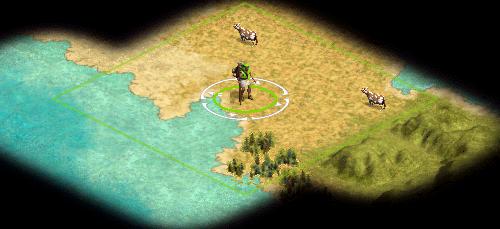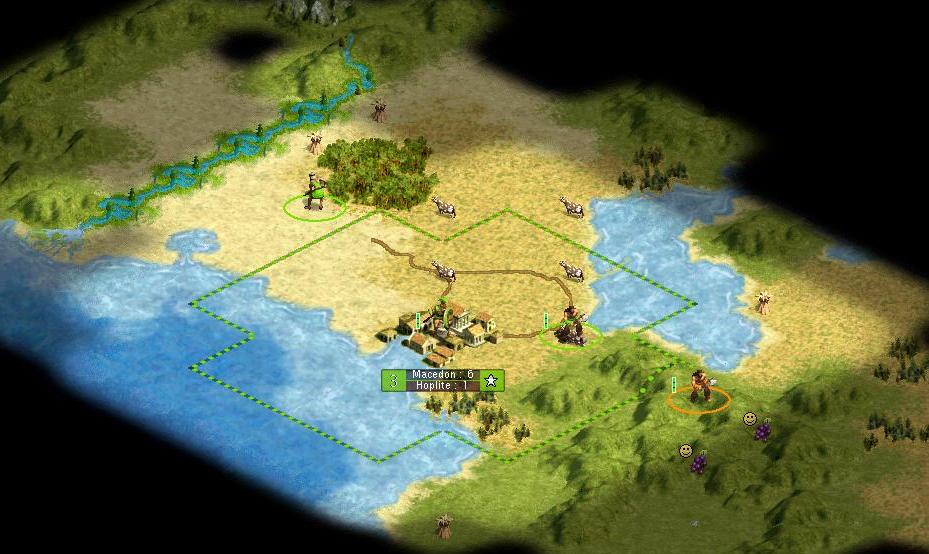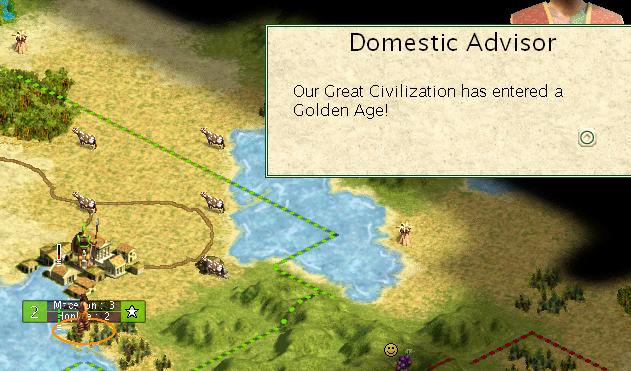

I went into this game with a variety of different feelings in mind. On the one hand, I had been playing a ton of Deity games (Epic4, Epic9, Epic12, RBE1 and RBE3) of late with only one Emperor game (Epic8) in there to break the run. I was more than ready for a break from Deity games so I could play something a little less strenuous! I also had not fared particularly well in my recent efforts, by losing the save game for Epic9 where I almost certainly would have won a triumphant victory and by getting conquered in Epic12 by the English. So a return to a winning game would be nice, and something I very much wanted.
On the other hand, although the difficulty was only Monarch level, Always War games play much harder than their nominal level. The general consensus is that the Always War variant is like adding two difficulty levels to the game - which would put me right back at Deity level again. And I could hardly expect to find a relaxing game when I was at war with all other civs at all times! Well, so much for that idea. It was time to go out and see what I could do with the game. I had no prior experience with the Always War variant, so it would be a novel experience for me as well. I downloaded the game on the Monday morning it became available and starting playing.

Well, there was the starting position. It didn't look that great at first - until you noticed the two cattle within view of the starting spot. I resolved to move the worker onto the cattle to the east in order to check if the water in the northeast was freshwater or not. If it was, I would move one tile northeast and settle; if not, I would found the city where I was. So I moved the worker, noticed a third cattle tile to the north of that initial screenshot (VERY nice) and right-clicked on the water. It said "coastal tile" and so I founded my first city right where I started in 4000BC.
Then the next turn I go to mine the cattle - and realize that I have the ability to irrigate it as well. Whaaat? But that means... I go back and reclick on the water and notice that it is producing 2 food and not 1. D'oh! It was freshwater after all! How could I have missed something so obvious? I had only looked at the title and not at the food production from that tile - lake tiles are always referred to as "coastal" by the game. What a dumb move. But I wasn't going to redo my opening, so now I would just have to stick with my starting location. The inability to grow past size 6 until I got Construction really, really slowed me down in this game, and may lead to others doing much better than me. We'll see on report day.
My research and production priorities were a bit different in this game than they would have been in an ordinary one. I started building a warrior right away, but researched Warrior Code first. I might need archers early on in case I was attacked (I already had Bronze Working and could build Hoplites since the Greeks are a scientific civ). After the warrior I built a hoplite, followed by a prebuild for a granary - something I wanted to have to avoid a disastrous fall in productivity whenever I built a settler. My warrior stayed very close to Macedon (my re-named capital) to avoid running into any other civs early on. I didn't care about the scenario points for early contact with other civs - I needed to make sure I would survive first! In 3250BC I saw a blue border to my north, REAL close to my north. Unless that civ (was it China or America?) had gotten a settler from a goody hut, that meant their capital was uncomfortably close to mine. I ran away without making contact. Of course I couldn't delay contact forever; the AI forced my hand on that one. England showed up in 3100BC:
This image has been lost.
There was no possibility of making a trade, as neither of us had MapMaking to trade maps and we actually had exactly the same techs. So as the rules state, I declared war on Elizabeth and dared her to do her worst. Well maybe not that, with memories of the carnage at the end of Epic12 still in my head. Rather than suicide themselves on my Hoplite, the English warrior fortified outside Macedon. With my city in the middle of a granary build, there was no way I could respond by attacking, so we sat there in a weird "sitzkreig" for the next couple turns with no action whatsoever. I took my first snapshot of my overall civ a few turns later in 2800BC:

That's the extent of my entire world there; no need to include the minimap because that's the extent of the fog that I have revealed. I was afraid to explore any further out of fear of finding more civs. My worker is building a road to the next city site that I will found, up on the river next to the floodplains wheat. Just look at all those cattle though! And if I had moved one tile NE before founding my capital... Arrggg! No use crying over what can't be changed though. In 2750BC (the next turn) an American warrior appeared in the north. Well, now I had my answer to which civ it was, but I also now had a very close enemy to deal with. I traded him Alphabet for Masonry and 10g and then declared war on his sorry behind. Do your worst, ha ha! Although I should mention that I only had 3 combat units at the time, and was at war with two other civs - could get ugly.
I sent out my first settler in 2550BC on the path that my worker had built, going to found Athens on the river. On the same turn, 2 American warriors appeared at the top of the screen and joined with the one fortified there (like the English one in the east) to move towards Macedon. At the same time, more English warriors appeared as well and moved towards my capital. Yikes! What bad timing - they were going to hit me on successive turns. There was nothing to do but build another hoplite and hope for some RNG luck. To make matters worse, out in eastern fog I saw a Roman city of Veii pop up. NOT good at all, though I did not have contact with them and definitely had no intentions of seeking it out.
The English reached me first and attacked in 2470BC. They had three regular warriors and I had two regular hoplites. The odds were strongly in my favor, and yet it was theoretically possible that I could lose here. The result:

Alright, a thoroughly useless Golden Age! I think I got maybe 1 or 2 extra shields per turn from it. But that was unavoidable given the nature of this game, so I didn't mind. You can see that the first warrior took two points off my hoplite (very low odds of that) and my other hoplite also just barely survived. If the number generator had been against me there... now there's something I don't want to think about. I fended off the American attack in 2390BC and was now pretty secure from attack, at least in my capital. This was the most desperate time in the game, and everything seemed to get a bit easier afterwards.
I founded Athens at about the same time and immediately began working on city walls. Those things are crucial to have in this sort of game, and at only 20 shields each even the most corrupted cities can build them quickly. A Zulu warrior appeared out of the fog in 1990BC, neccesitating another declaration of war. Shaka, why couldn't you have showed up one turn earlier or about 20 turns later? 1990BC is a terrible time to declare war. The Zulus didn't have anything to trade for either. I was also starting to wonder at this point how many civs were on my starting continent; I was at war with 3 other civs and knew that Rome was also on the island. That was a lot of opponents to be fighting, to say the least. Fortunately, the English and Zulus did not seem to be sending a lot of units my way, for reasons that only became apparent in the future. I pushed out my third city of Sparta in 1750BC to the northeast, on the lake close to the American capital. Here's the situation in 1750BC:

I had founded Athens before I even knew there were horses there - that was a nice stroke of luck. I wondered if I would have any iron though, as an Always War game is the LAST place that you want to be lacking resources. My Golden Age ran out in 1675BC, probably the earliest I've ever had a GA end on me. I got absolutely no use from it, but neither will anyone else playing this game. I killed my first Zulu unit in 1525BC; I guess I should also mention that I had lost no units yet at this point. Those hoplites are amazingly strong on the defensive, and the AI units were just impaling themselves on them. In 1500BC I met up with Caesar, much to my regret. One of his warriors wandered over the wine hills and I had to talk to him. I managed to trade for Iron Working though before declaring war and got a pop-up message saying "We have connected a road to bring iron into Sparta!" What? I had an iron resource underneath Sparta! And I had founded on that location without any knowledge of it being there. What a stroke of outrageous luck! I can't even what my game would have been like without swords and horses, and yet the iron was so close to America that they very easily could have snatched it from some players. Should be interesting to see what happened to everyone else. The bad news: I was now at war with 4 civs.
Action was pretty continuous from the other civs for the next 500 years. I had one front to defend by Macedon, where I would kill English and Roman units after they came over the hills. The second front was outside Sparta, where American and Zulu units would suicide themselves on the vet Hoplites behind walls in a city on a hill (defense 3 + 50% + 50% = 6). And the final front was north of Athens, where occasionally a stray American unit would appear above the river and attack across it. I had founded Thermopylae at some point in time around 1500BC on the coast to the west, intended to serve as a fishing town... and that was it. I was out of room to expand with only 4 cities. America was to the north, Rome to the southeast, and I had no idea where the Zulus and English were (except for north and south respectively). With no place to put new cities, I began building up forces to take them from the closest AI civ, namely America. I was not going to try and strike out across the hills and into Rome; the geography would have made reinforcing any cities taken nearly impossible. So it was Abe who would be the unlucky one in this game and feel the fury of Alexander first. Here was the basically unchanged situation in 1000BC:
This image has been lost.
I would post the minimap, but that is honestly the full extent of my revealed map at the time. Rather sad, but lack of map information is a reality of the Always War game. The foreign units you see are of course just part of the usual steady stream of AI units, coming in ones and twos non-stop throughout the game. From the number of lines under Sparta you can see I am amassing a force there to attack Washington; I had some 5 or 6 swords at this time and moved out when I got to 10. In 975BC a sad event occurred: my first unit died, a swordsman attacking an archer. Up to that point I had killed 22 enemy units (and I kept a tally of all kills throughout the game; see below). In 825BC Gandhi showed up as well in the north. Damn! How many people are on my island? I was beginning to wonder by this point - I had my hands full as it was! I was able to get Writing from him for a couple of techs he lacked and then declared war as usual. Two turns later Gandhi moved a settler/warrior pair out of the fog near me. Thanks buddy :)
I moved my attack force of swords out in 800BC, with the intent of capturing Washington. Abe did not put up a very good fight, and the city fell to me with no losses when I reached it in 750BC. How about that - a little present right before the 750BC demographics are measured. But Washington was only size 1, so I didn't get any big boost of population from it by any means. At this point I now had contact with all the civs on my island (which I can say easily now, writing this in retrospect) and had taken my first AI city. The initial phase of the game was over, and now the game was to descend into a bloody push up and down my island to destroy every last enemy city.
I mentioned above that I kept track of the combat results that went on in this game. While I'm sure that I made numerous errors in my highly unscientific stat-keeping, a number of interesting trends came out of it and I think anyone reading the game would be curious to see exactly what the combat results for an entire Always War game turned out to be. So, as of 750BC, these were the combat losses:
| Greece | America | England | Zululand | Rome | India | Total AI Civs | 750BC | 2 | 19 | 5 | 4 | 7 | 1 | 36 |
|---|






